Accounting Principles
Minnesota School Of Business
Page 2 out of 31 results
Sort by
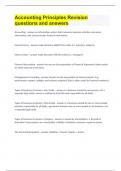
-
Accounting Principles Revision questions and answers.
- Exam (elaborations) • 15 pages • 2023
-
- $13.99
- + learn more
Accounting an information system that measures business activities, processes information, and communicates financial information. External Users make decisions ABOUT the entity (i.e. investors, bankers). Internal Users make decisions FOR the entity (i.e. managers). Financial Accounting focuses on the preparation of Financial Statements (often useful for those external to the firm) Management Accounting focuses on the preparation of internal reports (e.g. perform...
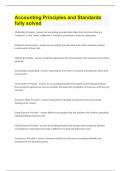
-
Accounting Principles and Standards fully solved
- Exam (elaborations) • 2 pages • 2023
-
- $14.49
- + learn more
Materiality Principle An accounting principle that states that only items that are "material" or that "make a difference" should be presented in financial statements Historical cost principle An accounting principle that states that companies should record assets at their cost. Matching Principle recognize expenses in the same period as the revenues they help to generate Accrual Basis Accounting reporting income when it is earned and expenses when they are incurred ...
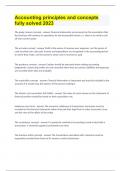
-
Accounting principles and concepts fully solved 2023
- Exam (elaborations) • 2 pages • 2023
-
- $12.99
- + learn more
The going concern concept Financial statements are prepared on the assumption that the business will continue its operations for the foreseeable future; i.e. there is no need to sell off non-current assets The accruals concept Profit is the excess of revenue over expenses, not the excess of cash received over cash paid. Income and expenditure are recognised in the accounting period to which they relate, not the period in which cash is received or paid The prudence concept Cautio...
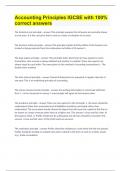
-
Accounting Principles IGCSE with 100% correct answers
- Exam (elaborations) • 2 pages • 2023
-
- $13.99
- + learn more
The historical cost principle This principle requires that all assets are normally shown at cost price. It is the cost price that is used as a basis of valuation of an asset. The business entity principle This principle implies that the affairs of the business are treated as being separate from the nonbusiness activities of its owner/s. The dual aspect principle This principle states that there are two aspects to every transaction. One account is always debited and another is cr...
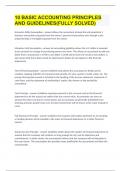
-
10 BASIC ACCOUNTING PRINCIPLES AND GUIDELINES(FULLY SOLVED)
- Exam (elaborations) • 2 pages • 2023
-
- $13.99
- + learn more
Economic Entity Assumption Allows the accountant to keep the sole proprietor's business transactions separate from the owner's personal transactions even though a sole proprietorship is not legally separate from the owner. Monetary Unit Assumption An accounting guideline where the U.S. dollar is assumed to be constant (no change in purchasing power) over time. This allows an accountant to add one dollar from a transaction in 1946 to one dollar in 2018 and to show the result as two dol...
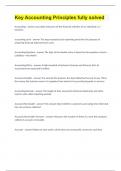
-
Key Accounting Principles fully solved
- Exam (elaborations) • 4 pages • 2023
-
- $13.49
- + learn more
Accounting accurately measures all the financial activities of an individual or a business. accounting cycle The steps repeated each reporting period for the purpose of preparing financial statements for users. Accounting Equation The logic of the double entry is based ont his equation: Assets = Liabilities + Net Worth Accounting Ethics A high standard of behavior (honesty and fairness) that all accountants are expected to follow. Accounts Payable The amount the ...
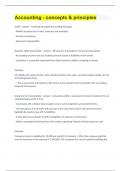
-
Accounting - concepts & principles.
- Exam (elaborations) • 7 pages • 2023
- Available in package deal
-
- $13.49
- + learn more
GAAP - Generally Accepted Accounting Principles - Widely accepted set of rules, concepts and principles - Achieve consistency - Approach comparability Business Entity Assumption - All business transactions ≠ personal transactions - Accounting records must not include personal assets or liabilities of the owner. - a business is accounted separately from other business entities, including its owner Example: Mr. Adolfo, the owner of Hair, There and Everywhere hair salon, recentl...
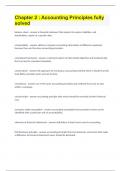
-
Chapter 2 Accounting Principles fully solved.
- Exam (elaborations) • 3 pages • 2023
-
- $13.49
- + learn more
balance sheet a financial statement that reports the assets, liabilities, and stockholders, equity at a specific date. comparability ability to compare accounting information of different companies because they use the same accounting principles. conceptual framework a coherent system of interrelated objective and fundamentals that can lead to consistent standards. conservatism the approach of choosing an accounting method when in doubt that will least likely overstate a...
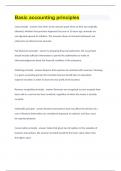
-
Basic accounting principles.
- Exam (elaborations) • 2 pages • 2023
- Available in package deal
-
- $13.49
- + learn more
Cost principle Cost refers to the amount spent when an item was originally obtained, whether that purchase happened last year or 10 years ago; amounts are not adjusted upward for inflation. The amounts shown in financial statements are referred to as historical cost amounts Full disclosure principle In preparing financial statements, the accountant should include sufficient information to permit the stakeholders to make an informed judgement about the financial condition of the ent...
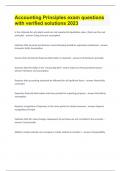
-
Accounting Principles exam questions with verified solutions 2023.
- Exam (elaborations) • 3 pages • 2023
-
- $13.99
- + learn more
Economic Entity company keeps its activity separate from its owners and other businesses Going Concern company to last long enough to fulfill objectives and commitments - assumes that any entity will continue to operate indefinitely. In this basis, assets are recorded based on their original cost and not on market value. Assets are assumed to be used for an indefinite period of time and not intended to be sold immediately Monetary Unit money is the common denominator; currenc...

$6.50 for your textbook summary multiplied by 100 fellow students... Do the math: that's a lot of money! Don't be a thief of your own wallet and start uploading yours now. Discover all about earning on Stuvia


